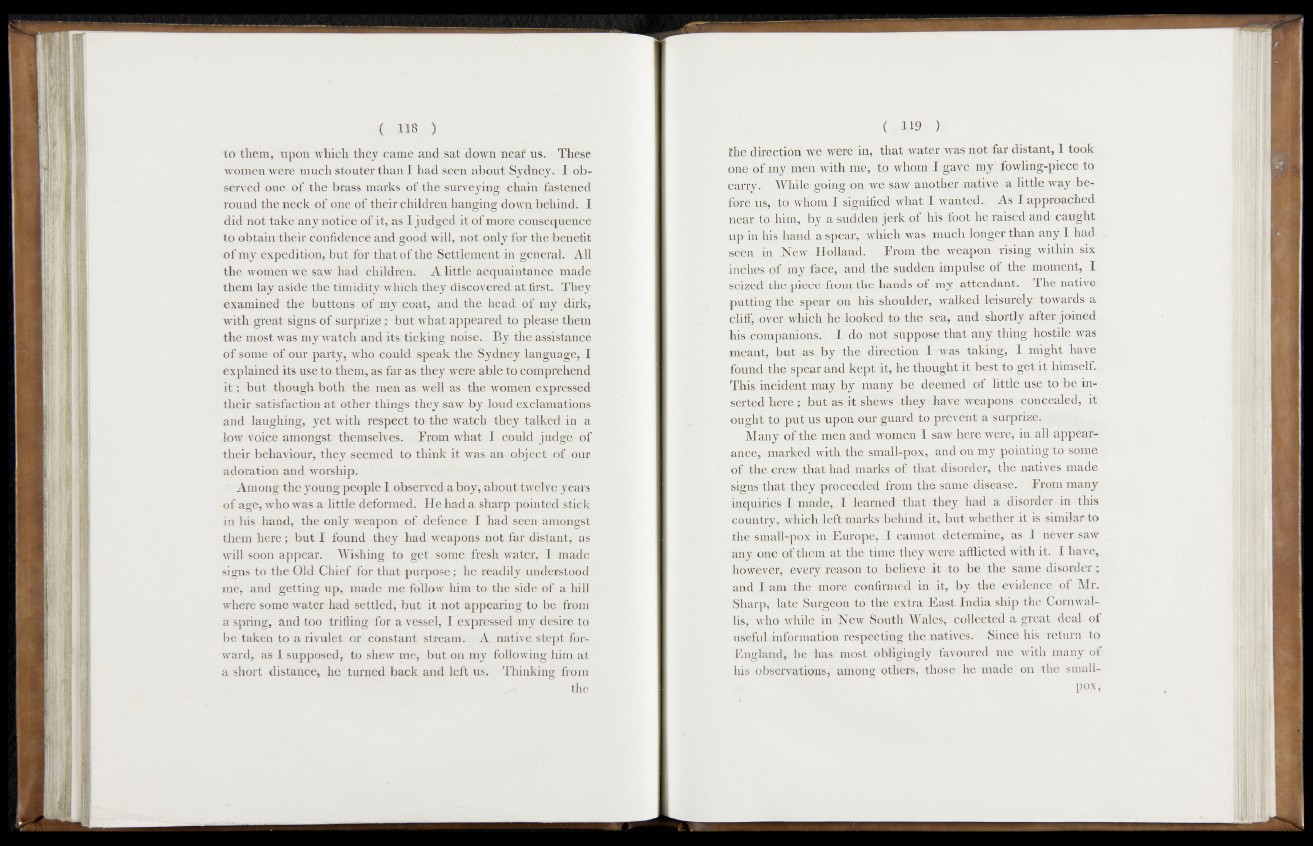
to them, upon which they came and sat "down neaf us. j These
women were much stouter than I had seen .afedutfi^sdney. Iybbs*
served one of the brass marks, of the.suatveytng chain fastened
round the neck of cme of then children hanginjgfdown behind. I
did not take any notice of it, as I judged it>of more consequence
tp obtain their confidence and good; will, not only fsaf thd benefit
o f my expedition, but for that of the Settlement in general. All
the women we g aw had„children. A little acquaintance made
them lay aside the timidity which they disc»ered aMipst.*, They
examined the buttons of my coat, and the- head of my dirk;
with great signs, of surprize but what appeared: t® please tisen*
the most was my watch and its ticking noise;-. By the assistance
of some, of our party, who could speak tlie Sydney, language, 1
explained its use to them, as far as they were able to comprehend
i t ; but though, both the men as well as the women expressed
their satisfaction a t other things they saw by loud exclamations
and laughing, yet with respect to the watch they talked in a
low voice amongst themselves. From what I could, judge ©f
their behaviour, they seemed to think it was an objhete.iqfL our
adoration and worship.
Among the young people 1 observed a boy, about twelve years
of age, who was a little deformed. He had a sharp'pointed stick
in his hand, the only weapon of defence I had seen amongst
them here; but I found they had weapons not far distant, as
will soon appear. Wishing, to get some fresh water, I made
signs to the Old Chief for that purpose; he readily understood
me, and getting, up, made me follow him to the side of a hill:
where some water had settled, but it not appearing to be from
a spring, and too trifling for a vessel, I expressed my desire to
be taken to a rivulet or constant stream. A native sfcept for»
ward, as I supposed, to shew me," but on my following him at
a short distance; he turned back and left us; Thinking from
the
thfipfi(|feni we were in, th a t water was not far distant, I took
©ne„ef my men with rate, to whom I gave,toy' fowling-piece to
carry. While, jgoijag on we saw another-native a l iÖ f way be»
fore.us,! to whom I signified what I wanted* >■ As I approached
neaf'jto him, by a sudden je rk ,of his foot he raised and caught
up in his' hand a spear, which was much longer than any I h ad ,.
aefenj in Holland. From the weapon rising .within six.
inches of my fbee,, and the snaideia impulse of the moment, I
seized the-piece/from the hands o f my attendant:. The native-
putting the spear >on fife, shoulder,, walked leisurely, towards a;
clif,-over which ^ë, looked to, thei -and shor% after joined
his -companions.' I do not- suppose that any tiling hostile was
meant, but-as by the direction I was taking, I might have
found the spear and keptit* he thought it best to. g e fit himself-
This: incident may by many be deemed of little u s e to h e inserted
here; but as, i-t shews-they have weapons concealed, it
ought to, put,us upon our guard to prevent a shrprizfe.
"ü ^ an y ol’the men and women I
anee,, marked with the small-pox, and on my pointing to some
of the crew.; th a t had marks of tiratdisorder, the natives made
mgm that they proceeded from the same disease. From many
inquiries I made, I learned that they had a disorder in this
country,' Which left marks'behind it,- but whétiier it is similar to
the smalEpox in Europe, I cannot determine, as T ; never saw
any one of them at the time they were afflicted with it. I have,
however; .every reason tobtiaeve it to be the same disorder ;
and I-am th e more confirmed in .it, by the evidence of Mr.
Sharp, Ifite Surgeon to thh extra East India ship the •Corhwal-
lis, who while in-New South Wales, collected a great deal of
useful information respecting tiae natives, j* Since his return to
England, he has most obligingly -favoured me with many of:
his observations, among others, those be made on the smallpox,